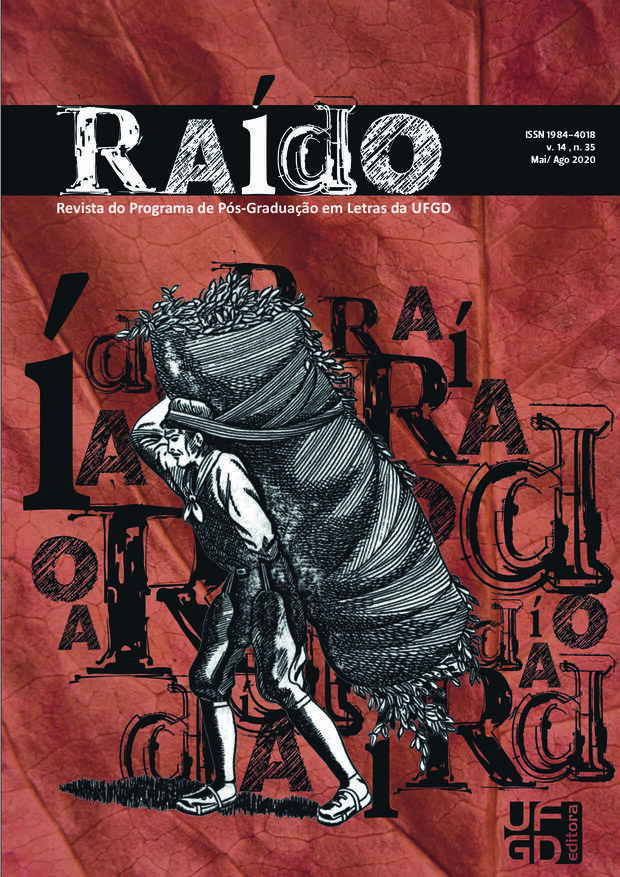Apresentação - Dossiê Política estratégica femenina: Discurso Femenino y Cultura patriarcal
DOI:
https://doi.org/10.30612/raido.v14i35.12996Keywords:
Apresentação.Abstract
Apresentação do Dossiê Política estratégica femenina: Discurso Femenino y Cultura patriarcal.Downloads
References
BLOOM, Harold. The Western Canon: the Books and School of the Ages. New York: Harcourt Brace, 1994.
DERRIDA, Jacques. ‘The Law of Genre’, Glyph 7, 202-32, 1980.
DÍAZ-DIOCARETZ, Myriam. ‘I will be a Scandal in Your Boat’: Women Poets and the Tradition’. in Knives and Angels: Women Writers in Latin America, ed. Susan Bassne. London: Zed, pp. 86-109, 1990.
DUFF, David. ‘Introduction’, in Modern Genre Theory, ed. David Du. Harlow: Pearson. pp. 1-24, 2000.
FOWLER, Alastair. Kinds of Literature: an Introduction to the Theory of Genres and Modes Oxford: Clarendon, 1982.
GARCÍA PINTO, Magdalena. ‘Woman’s Writing’, in. Encyclopedia of Latin American Literature, ed. By Verity Smith. London and Chicago: Fitzroy Dearborn, pp. 855-58, 1997.
GERHART, Mary. Genre Choices, Gender Questions. Norman and London: University of Oklahoma Press, 1992.
GILBERT, Sandra M.; GUBAR, Susan. The Madwoman in the A ic: the Woman Writer and the Nineteenth-Century Literary Imagination. New Haven and London: Yale University Press, 1979.
GONZÁLEZ STEPHEN, Beatriz. “Para comerte mejor”: cultura calibanesca y formas literarias alternativas’, Casa de las Américas, 185, 81-93, 1991.
JEHENSON, Myriam Ivonne. Latin American Women Writers. Class, Race and Gender. Albany: State University of New York, 1995.
KAMINSKY, Amy K. Reading the Body Politic: Feminist Criticism and Latin American Women Writers. Minneapolis: University of Minnesota Press, 1993.
KAPLAN, Caren. ‘Resisting Autobiography: Out-Law Genres and Transnational Feminist Subjects’, in De/Colonizing the Subject, ed. Smith and Watson,. pp. 115-38, 1992.
KIRKPATRICK, Susan. Las Románticas. Women Writers and Subjectivity in Spain, 1835-1850. Berkeley: University of California Press, 1989.
KRISTEVA, Julia. ‘Women’s Time’, in The Kristeva Reader, ed. Toril Moi. Oxford: Basil Blackwell, 1986.
LAVRÍN, Asunción (ed.). Latin American Women. Connecticut: Greenwood Press, 1978.
MASIELLO, Francine. ‘Texto, ley, transgresión: Especulación sobre la novela (feminista) de vanguardia’. Revista Iberoamericana v. LI, n. 132-133, pp. 807-822, 1985.
MASIELLO, Francine. ‘Discurso de mujeres, lenguaje de poder: reflexiones sobre la crítica feminista de la década de los 80’. Híspamérica ano 15, n. 45, pp. 53-60, 1986.
MEDEIROS-LICHEM, María Teresa. Reading the Feminine Voice in Latin American Women’s Fiction: from Teresa de la Parra to Elena Poniatowska and Luisa Valenzuela. New York: Peter Lang, 2002.
MOI, Toril. Sexual/Textual Politics: Feminist Literary Theory. London: Routledge, 1985.
PASTOR, Brígida M. Fashioning Cuban Feminism and Beyond: The Prose works of Gertrudis Gomez de Avellaneda. New York: Peter Lang, 2003.
RICHARD, Nelly. Masculine/Feminine: Practices of Diference(s), trans. Silvia R. Tandciarz and Alice A. Nelson. Durham and London: Duke University Press, 2004.
Downloads
Published
How to Cite
Issue
Section
License
Os autores devem aceitar as normas de publicação ao submeterem a revista, bem como, concordam com os seguintes termos:
(a) O Conselho Editorial se reserva ao direito de efetuar, nos originais, alterações da Língua portuguesa para se manter o padrão culto da língua, respeitando, porém, o estilo dos autores.
(b) Autores mantém os direitos autorais e concedem à revista o direito de primeira publicação, com o trabalho simultaneamente licenciado sob a Atribuição-NãoComercial-CompartilhaIgual 3.0 Brasil (CC BY-NC-SA 3.0 BR) que permite: Compartilhar — copiar e redistribuir o material em qualquer suporte ou formato e Adaptar — remixar, transformar, e criar a partir do material. A CC BY-NC-SA 3.0 BR considera os termos seguintes:
- Atribuição — Você deve dar o crédito apropriado, prover um link para a licença e indicar se mudanças foram feitas. Você deve fazê-lo em qualquer circunstância razoável, mas de nenhuma maneira que sugira que o licenciante apoia você ou o seu uso.
- NãoComercial — Você não pode usar o material para fins comerciais.
- CompartilhaIgual — Se você remixar, transformar, ou criar a partir do material, tem de distribuir as suas contribuições sob a mesma licença que o original.
- Sem restrições adicionais — Você não pode aplicar termos jurídicos ou medidas de caráter tecnológico que restrinjam legalmente outros de fazerem algo que a licença permita.



